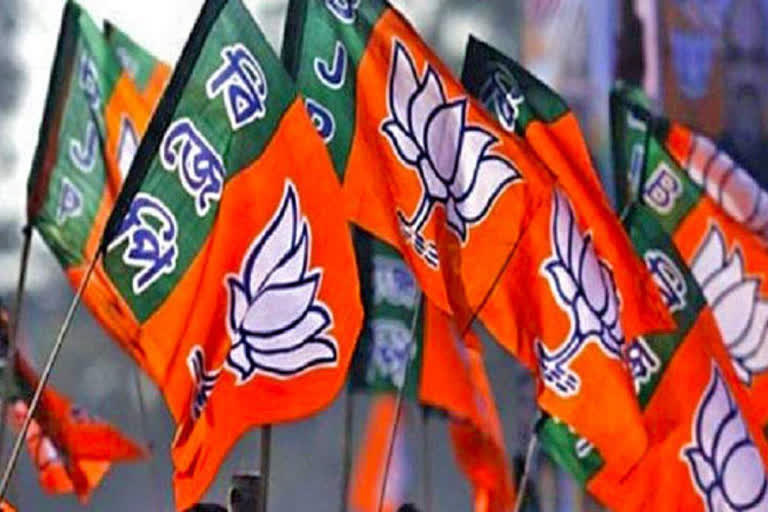Kolkata: To the surprise of many, BJP emerged in North Bengal as a formidable political force in the 2019 Lok Sabha elections. The saffron camp was in the driving seat in most of the Lok Sabha constituencies in North Bengal then. Even in the 2021 West Bengal assembly elections, BJP's performance in this part of the state was far better than other pockets as they managed victories in 29 out of 54 assembly constituencies in north Bengal.
However, after the results of the 2021 assembly elections results were declared, BJP's organisational strength started losing its grip in North Bengal. The saffron camp have started feeling the pinch of the retreating wave to Trinamool Congress throughout the state including the hills and the plains in north Bengal. Recently, five elected BJP legislators from North Bengal were absent at a party conference there. Their absence has already sparked rumours about the possibilities of their joining the ruling party camp.
On Saturday, BJP's elected legislature from Kaligunj assembly constituency in North Dinajpur district, Soumen Roy, joined Trinamool Congress. Despite being present at the aforesaid party conference in north Bengal just three days back, he chose to join the ruling party. Now the question that is doing the rounds is that how many MLAs from the saffron camp in North Bengal will ultimately join Trinamool Congress. Questions are also being raised about the actual strength of the BJP organisational network in North Bengal.
Former Trinamool Congress MLA and the chairman of the party's Cooch Behar district committee, Udayan Guha has precisely raised this question. "Officially, BJP emerged as a formidable political strength in North Bengal in 2019. However, that was not the reflection of BJP's core strength in North Bengal. BJP sold a lot of dreams before the polls and the people of North Bengal got hoodwinked by that. But now their facade has been removed," he said.
According to Guha, in 2019 BJP played the religion card and influenced the minds of the refugees coming to Bangladesh. Thus they secured public support then. But later the people realized. their mistake. Now they are again trying to mislead the people of North Bengal by raising the issue of separate statehood. But this has made the people, in general, angry and has started moving away from BJP.
According to him, the recent phase of camp swapping is the reflection of the public anger towards BJP. "After the leaders decided their steps according to the public pulse. Without detailing, he also referred to certain organizational issues in North Bengal. However, he added that soon such issues will be resolved.
However, once a Trinamool leader from the same district of Cooch Behar and the current BJP legislator Mihir Goswami is not in agreement with Guha. "Why is Trinamool Congress so bothered about our future in North Bengal. The people of the region voted for BJP in most of the assembly constituencies out of love. So people are surely joining Trinamool Congress to serve self-interest. But that would not impact BJP in the region. Camp swapping does not necessarily decide the growth in the organisational network of a political party. We are with the people of North Bengal and hence we are acceptable to them," Goswami said.
Political observers, however, refuse to describe this camp swapping tendency as mere coincidence. According to reputed political analyst, Subhasish Moitro, before the assembly elections, several leaders joined BJP from Trinamool Congress out of their political ambition. "However, the dreams of many did not fructify. BJP might be reaped in states like Assam by alluring leaders from other parties. But that was not the case for West Bengal. So many are trying to return to Trinamool since their ambitions were not fulfilled," he said.
According to him, such leaders have become impatient since they are not sure whether BJP will ever be successful in coming to power in West Bengal. "Such leaders are there in both South Bengal and north Bengal," he said.
Political scientist and the former principal of the then Presidency College, Dr Amal Kumar Mukhopadhyay, lack of basic political ideology is the main reason behind this camp swapping. "Association with the ruling party is always beneficial financially. So that is why leaders from opposition parties are trying to come under the ruling party fold. The tragedy is that for these leaders serving self-interest is more important than public service," he said.
According to political analysts, the political culture of the Hindi-belt is slowly setting in West Bengal. This culture of camp swapping started in Madhya Pradesh and Trinamool Congress started this culture in West Bengal. However, Trinamool Congress did not resort to camp swapping before 2011, the year when it came to power in West Bengal ending the 34-year long Left Front rule. They started this trend in 2011.
On the other hand, BJP started this camp swapping trend in West Bengal before the 2021 state assembly elections hoping to grab power. They were successful in gaining from this camp swapping in other states, but not in West Bengal.
Political observers feel that since the BJP network was much dependent on this camp swapping, it is difficult to access its actual organisational strength in the state.
